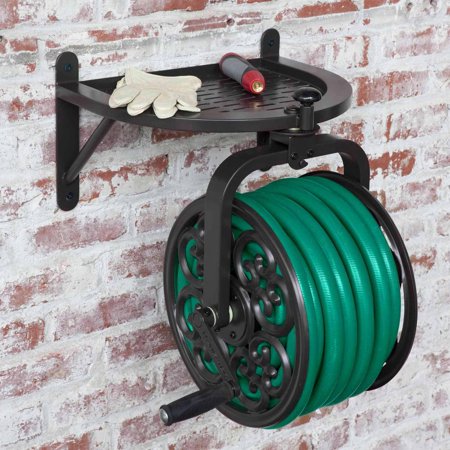
How to take care of your garden hose

Keeping your garden hose in good condition is important -- it will save you the trouble of dealing with kinks and other problems that could happen to your hose. It will also save you money because a well-kept garden hose can last for quite a while! We wanted to provide you with some ideas on how to keep your garden hose in good shape.
Storage (for spring and summer)
There are a few different ways to store your garden hose. Here are some options:
- Hose Pot -- this is a good option if you want to keep your garden hose close to your plants. Make sure that your garden hose pot has drainage holes! If it doesn’t, it could become a breeding area for mosquitoes and other bugs.
- Hose Reel -- A hose reel is a great option if you aren’t interested in getting dirty. Many hose reels come with wheels, which is easy to push around your yard and very convenient. (Looking for a quality hose reel? Check out our products at factorydirecthose.com!)
- Hose Rack -- this is a tool that you hang on the wall of your garden. A hose rack is worthy of consideration because it saves lots of space. The only downfall of using a hose rack is that you have to coil your own hose (see instructions on how to coil your hose below).
Coiling your hose
Here are some steps on how to coil your hose correctly:
- turn off the water connected to the hose
- hold your hose a couple feet away from the spigot
- create a loop around 3 feet in diameter
- while holding onto the loop with one hand, reach a couple feet down the hose and create another loop. Put this loop on top of the first.
- Continue making and stacking loops throughout the whole hose
Storage (for winter)
It is important to store your hose in the wintertime if you want it to last. Below are some steps on how to properly store your garden hose in the months of winter:
-
Drain your hose -- let as much water out of your hose as possible. If the water in your hose remains over the winter, it will freeze and expand. This can cause cracks and leaks in your hose. Drain your garden hose by placing one end on the ground while holding the hose over your shoulder. When the water starts to drain slowly, pull your hands along the remainder of the hose while allowing it to coil. If you have an RV and your hose freezes watch this 2 minute video to show you a way to unfreeze your frozen coupling (spoiler alert - watch until the dog lick at the end). Here is another great article with practical ways to unfreeze your garden hose.
-
Check for damage -- start by checking the ends of your hose for broken fittings, and then check the hose itself for cracks. If there are any cracks, cut that section off of the hose and replace it with a hose mender. Cut as straight as possible and use a sharp blade. When purchasing the hose mender, take the damaged part of the hose with you to ensure that you buy the right kind. Also, be sure to check your hose’s washers (they can dry up over time). If they need to be replaced, rubber washers are an excellent replacement.
- Store inside -- storing your garden hose inside will help it to last longer. A garage (preferably a heated garage) is a great place to store the hose. Make sure that you organize all of the accessories and store them next to the garden hose. You’ll be glad you did this when you need them in the coming spring!
We hope you learned a little more about how to care for your garden hose. Comment below with your own tips!
Looking for a quality garden hose or garden hose reel? Check out our products at factorydirecthose.com!
